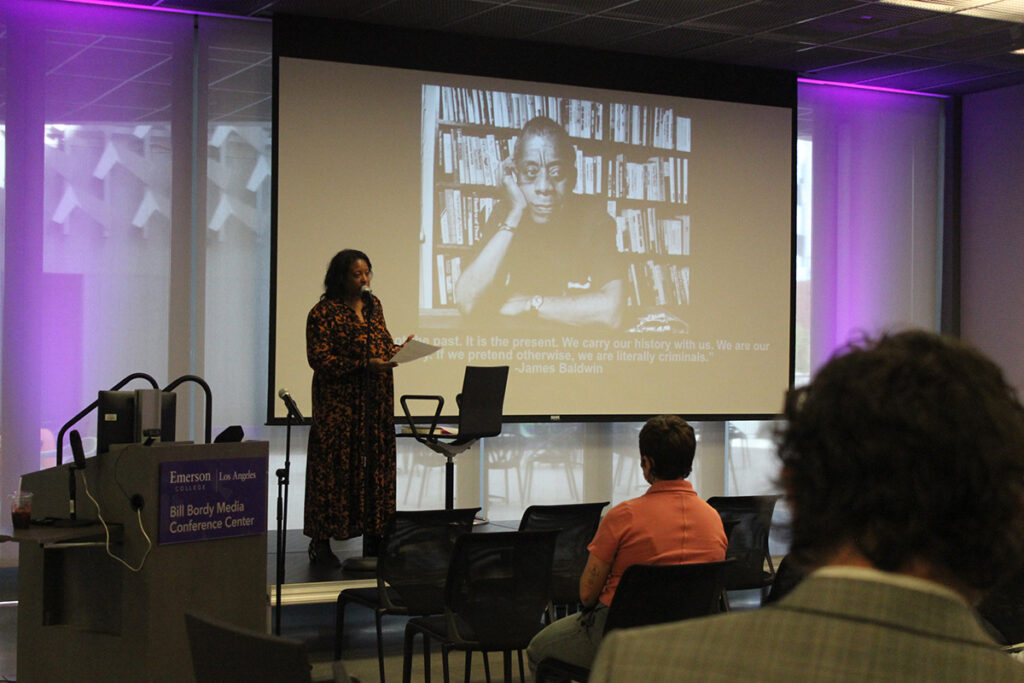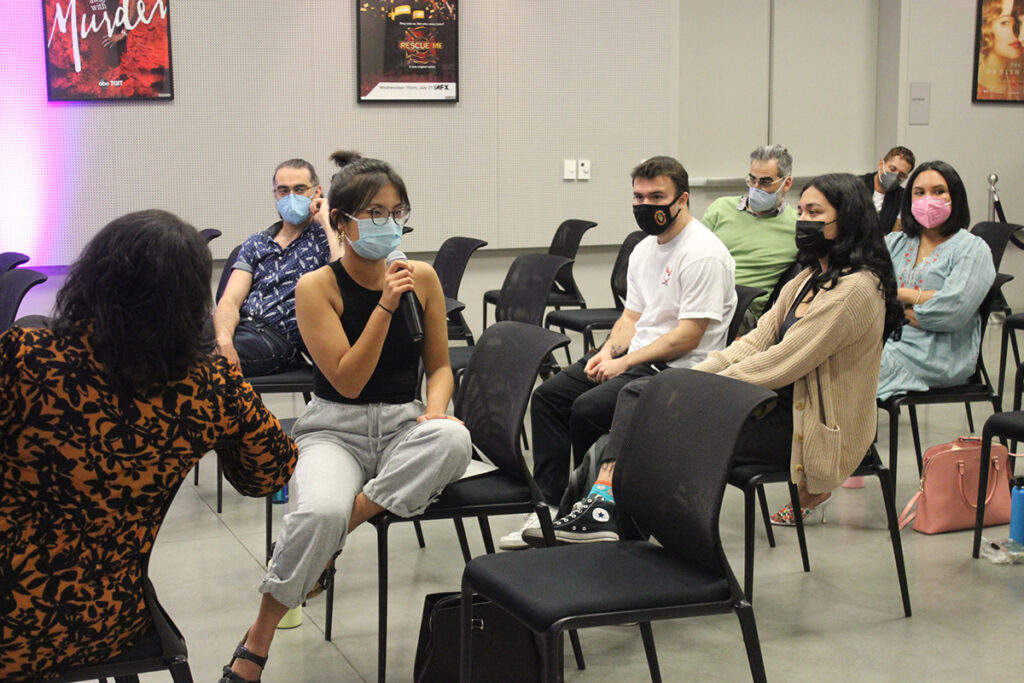Emerson LA Commemorates Anniversary of ’92 Uprising

Emerson Los Angeles (ELA) commemorated the 30th anniversary of the 1992 LA Uprising Friday, March 25, with a series of personal reflections, readings, and lectures by faculty members followed by a discussion with students.
ELA faculty members Leticia Garcia Dahan, Oliver Jones, Soo Mee Kim, Shana Lloyd, and visiting Boston faculty member Ian McManus participated in the event. Assistant Academic Dean Mikhail Gershovich served as moderator.
“Gathering together to reflect on the civil unrest in LA in 1992 is something our faculty members initiated,” said Gershovich. “It’s an important part of our history that we all felt our ELA community should engage and commemorate.”
In April 1992, in response to the acquittal of four Los Angeles Police Department officers on trial for the brutal beating of African American motorist Rodney King that was captured on video, LA saw multiple days of civil unrest that have had a lasting impact on the city and the national discourse on race and justice in America.
Lloyd opened the event with a spirited reading of selections from writers such as James Baldwin, Walter Mosley, and Wanda Coleman. McManus discussed events in history that have dehumanized Black Americans and incidents that led up to the ’92 uprising.
“There’s a lot of history in our country that is deeply uncomfortable to look at, and we often want to treat events like what happened in LA ’92 as an anomaly, as an exception, as some kind of minor part of history we can either whitewash or ignore over to the side,” said McManus. “This is central to our experience; this is our history. This isn’t an aberration.”

Jones discussed the significance of having the beating of King captured on video. Kim was not in attendance but shared a video produced by her Fall 2021 semester students featuring memories and perspectives of individuals in the Latinx community who experienced the uprising.
Garcia Dahan closed with a few excerpts from the book Twilight: Los Angeles, 1992, a one-woman play written and originally performed by Anna Deavere Smith. During a discussion after the presentations, she shared her feelings on why the event was so significant.
“It takes events like this for different types of people to teach you different types of things and different types of perspectives,” said Garcia Dahan. “I think representation is important, because that is how we learn and are taught about different things.”
Marketing Communication major Liza Xiao ’22 said she attended the event to gain more knowledge about the uprising as an international student who first learned about what happened in 1992 from a friend at Emerson.
“As I try to navigate the complexity of race in America, I’ve started to realize the pivotal importance of this event in the nation’s recent history. And because I’m Asian, I felt it’s more relevant for me to understand due to the involvement of the racial tension between African Americans and Korean Americans [at the time],” said Xiao.
Jones said it’s pivotal for our culture to understand what led to the uprising and as an educator, he believes that it’s important to teach the untold history of LA.
“Social justice imperatives that were voiced and cited in the spring of ’92 have yet to be fully addressed or completely addressed, and understanding what the underlying issues were helps to understand why they’re not addressed and why they exist today,” said Jones.
Journalism major Robert Dziejma ’22 said the event provided a lot of insight that helped him learn about the different perspectives affected by the uprising.
“I thought the way they highlighted different communities was really interesting,” said Dziejma. “I had no idea the extent that the Latinx community suffered during the LA riots, and also Koreatown.”
Many of the students in attendance were grateful to have learned more about the events of 1992. Garcia Dahan, and other faculty members and staff in attendance, said it was the best event they’d ever attended at ELA.
While reflecting on the anniversary, Lloyd discussed what has and hasn’t changed since 1992. She drew a link between events of that time to the present day, focusing on how younger generations are collectively seeking to improve justice within our structural systems.
“[One change] for me, which is interesting, is much more BIPOC solidarity that came from ’92, particularly Black and Brown communities,” said Lloyd. “There was much more of a gelling of the communities after Rodney and [the] ’92 uprising and also now seeing coalitions of young BIPOC, like Asian/AAPI communities, the Indigenous community, Latinos, Blacks, start coming together to combat systemic racism.”
Gershovich and faculty members emphasized how crucial it is to remember and discuss what happened in 1992 so that we can all understand and learn from our history.
“It’s important to remember that the events that led to the riots in 1992 didn’t happen in a vacuum and, like the killing of George Floyd in 2020 and the unrest that followed, that it’s all a part of repeating patterns in American justice and policing and race in America in general,” said Gershovich. “We felt that commemorating and foregrounding these events is a way to remember their lasting significance to Los Angeles and to historicize our present moment in a meaningful way.”
Categories